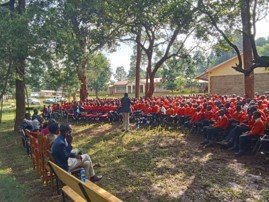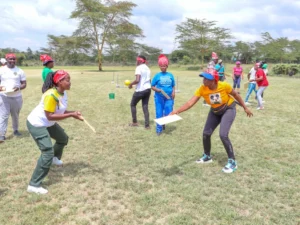Three cases of sexual defilement following cases of students at Kaptimbor Primary School in Baringo County were for the first time successfully prosecuted, leading to the perpetrators’ imprisonment, and five additional cases are still in court awaiting determination. These cases highlight the significant risks and persistent challenges, collectively referred to as the Triple Threat, which includes new HIV infections, early and teenage pregnancies, as well as sexual and gender-based violence among adolescents and young people in this area.
The Baringo County Children Officer coordinated the transformation, working alongside fifteen other Place-Based Leadership Development (PBLD) leaders from the Kabarnet cohort, who united key stakeholders to mobilize physical, financial, and human resources to strengthen the Triple Threat initiative. This included the following actions:
- Visiting learning institutions across the country: During these school visits, PBLD leaders engaged students in discussions on child rights, GBV, menstrual health, active listening, problem-solving, counseling, and confidentiality to encourage reporting of violence. They also worked with parents and teachers to shift mindsets on handling student reports and ensuring safety.
- Initiating community-level interventions led by women and girls to mitigate the Triple Threat: Students at Kipkaech Secondary School were supported in establishing a Child Rights Club to develop strategies for self-protection, share knowledge on reporting channels, and strengthen their ability to advocate for their rights and safety within the school and community. The student-led club hosts teachers, PBLD leaders, and local authorities who offer guidance and support, helping students address challenges and access the help they need. As a result, the teacher-student relationship has improved and created a safe space to refer cases to the children’s officer and the police.
At the community level, the PBLD leaders united vulnerable girls to form a football team, using sports as a platform to empower them, foster unity, and address the triple threat while serving as a preventive measure against FGM in Baringo County. This team is the only girls’ football team in the county recognized by the Federation of Kenya Football and is officially listed in the Lower Rift Region division league. Using sports as an engaging approach to bring girls together creates a safe environment where they can connect and build trust to discuss preventive measures on the Triple Threat challenges comfortably.
CONTEXT
Vulnerable girls face significant risks of early and forced marriages, teenage pregnancies, and HIV/AIDS infections (Triple Threat), often with little access to safe spaces or alternative pathways for empowerment. The Triple Threat is further exacerbated by retrogressive cultural practices such as Female Genital Mutilation in Baringo County as a precondition for marriage. There exist limited effective interventions to address this harmful tradition. According to the Kenya Demographic Health Survey (2022), teenage pregnancies among girls aged between 15 – 19 in Baringo County were at 20% against a national average of 15%.
Traditional approaches to FGM prevention have primarily focused on awareness-raising and legal interventions. Still, there has been limited emphasis on providing girls with alternatives that empower them to make their own choices as well as holding perpetrators to account through the criminal justice system.
Before the intervention by the PBLD leaders, students rarely reported sexual violence cases, which contributed to the normalization of teenage pregnancies, early and forced marriage, as well as defilement among girls. The girls face stigma that disrupts their education.
These interventions have significantly improved the relationship between teachers and students, resulting in the reporting of eight cases, three of which have led to convictions.
CONTRIBUTION
Through Place-Based Leadership Development (PBLD), MIDRIFT HURINET built the capacity of 61 leaders in Baringo between 2020-2024 to address systemic challenges in their communities. The leaders were part of 8 PBLD modules on mindset shift, skillset, and toolset designed to enable them to grapple with community issues by facilitating intersectoral collaboration to address a systemic challenge – in this case triple threat in Baringo. Between each module, the intersectoral leaders implement the action plans developed during the previous module to address identified challenges while applying the knowledge gained through the programme. The school visits and the community-led initiatives were part of action plans developed by these PBLD leaders.
Since 2016, MIDRIFT has built the capacity of 673 leaders nationwide across various sectors to address systemic issues within their communities. Of these, 477 were developed through PBLD, while 196 were trained as Place-Based Leadership Development Facilitators.



